What an honor to be a speaker at a Christian college chapel service. Nerve-wracking, too, I must admit. Yesterday, I had the privilege to share with the student body at Western Pennsylvania’s Geneva College, at a special service sponsored by the Career Development office. Perhaps better than many colleges, their office helps students frame their academic work and choice of majors by the Biblical doctrine of calling. For the collect opening the service, we read responsively from Os Guinness’ famous book The Call: Finding and Fulfilling the Central Purpose of Your Life (Nelson; $17.99.) Did they know it is one of my all-time favorite books? Did they expect that I would cite it? It was such a fitting way into a liturgical celebration of God’s call into His kingdom, and the subsequent duties to serve the great King in every zone of life. Of course we shouldn’t reduce our many callings to only our paid jobs, and, in fact, the director of the Career Development office explained to me that they (ironically) try not to use the word “career” for a variety of reasons, noting the baggage and assumptions such a phrase carries. So, yes, we are called to a variety of places, various “offices” or tasks, with all sorts of God-given opportunities and obligations. We are called and sent. Guinness is still my favorite author on this and it is a book I revist over and over. If you don’t have it, please, please, consider it. The discussion guide in the back is very strong, too, making it an exceptional resource.
service, we read responsively from Os Guinness’ famous book The Call: Finding and Fulfilling the Central Purpose of Your Life (Nelson; $17.99.) Did they know it is one of my all-time favorite books? Did they expect that I would cite it? It was such a fitting way into a liturgical celebration of God’s call into His kingdom, and the subsequent duties to serve the great King in every zone of life. Of course we shouldn’t reduce our many callings to only our paid jobs, and, in fact, the director of the Career Development office explained to me that they (ironically) try not to use the word “career” for a variety of reasons, noting the baggage and assumptions such a phrase carries. So, yes, we are called to a variety of places, various “offices” or tasks, with all sorts of God-given opportunities and obligations. We are called and sent. Guinness is still my favorite author on this and it is a book I revist over and over. If you don’t have it, please, please, consider it. The discussion guide in the back is very strong, too, making it an exceptional resource.
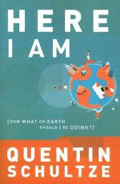 Another book that we often suggest for those pondering this idea of vocation and calling is the exceptional, easy-to-read exploration of the notion of vocation in Here I Am: Now What on Earth Should I Be Doing? by Quentin Schultze (Baker; $14.00.) What a great little book, wise and helpful, about being stewards of the various gifts God gives us, in the various spheres he calls us to! One of the best, with reasonable theological foundations and lots of great illustrative stories and anecdotes Q is a great storyteller—he is the head of the communications department at Calvin College in Michigan and has a remarkable book on virtues needed for our electronic age and another which is the definitive book on communication and mass media from a Christian perspective (and yet another small one on public speaking.) What a story this guy has, and how wonderfully he’s used his own scholarly vocation to help others with these basics. Highly recommended. Check out his amazing blog of comment and reviews, here.
Another book that we often suggest for those pondering this idea of vocation and calling is the exceptional, easy-to-read exploration of the notion of vocation in Here I Am: Now What on Earth Should I Be Doing? by Quentin Schultze (Baker; $14.00.) What a great little book, wise and helpful, about being stewards of the various gifts God gives us, in the various spheres he calls us to! One of the best, with reasonable theological foundations and lots of great illustrative stories and anecdotes Q is a great storyteller—he is the head of the communications department at Calvin College in Michigan and has a remarkable book on virtues needed for our electronic age and another which is the definitive book on communication and mass media from a Christian perspective (and yet another small one on public speaking.) What a story this guy has, and how wonderfully he’s used his own scholarly vocation to help others with these basics. Highly recommended. Check out his amazing blog of comment and reviews, here.
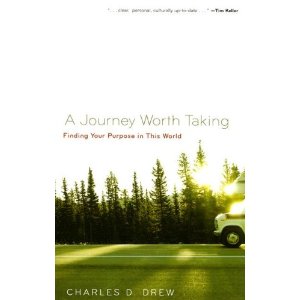
Or, consider the more thoroughly Biblical overview A Journey Worth Taking: Finding Your Purpose in This World by Charles D. Drew (P&R; $12.99.) Some have told me this was the best combination of the Biblical overview of creation-fall-redemption-restoration story of Scripture and the language of purpose (exploring, then, the themes of vocation and call) that they’ve ever read. Rev. Drew is certainly a solid writer, well crafting mature sentences in wise and wonderful ways. Endorsements from the likes of Tim Keller remind us that it is highly regarded, well considered, helpful and theologically rich, without being arcane or abstract. Yeah.
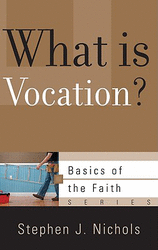 What Is Vocation Steven J. Nichols (P&R; $3.99) This is a wonderful, small booklet, similar to the What is A Christian Worldview by Philip Ryken (P&R; $5.00) that we often promote. It could be used in small groups, a quick adult ed class, or given to high school seniors. Steve gets it just right; he’s a nearly local guy, by the way, a Lancaster friend, writer of popular level books on church history and several biographies of folks like Luther and Edwards. (Not to mention the spiffy Church History ABC book we’ve touted.) This brief staple-bound booklet is as handsome as it is readable and could be life-changing. I hope you have something like this )at the bare minimum) on your bookshelf. Maybe you should order a dozen or so and pass ’em out—at least to youth who are thinking about going off to college, or young students needing to be encouraged to think about calling as they consider their majors, or for adults who may be longing to be affirmed in their line of work. (Oh, if only pastors did this more for their flocks, affirming the life of the laity!)
What Is Vocation Steven J. Nichols (P&R; $3.99) This is a wonderful, small booklet, similar to the What is A Christian Worldview by Philip Ryken (P&R; $5.00) that we often promote. It could be used in small groups, a quick adult ed class, or given to high school seniors. Steve gets it just right; he’s a nearly local guy, by the way, a Lancaster friend, writer of popular level books on church history and several biographies of folks like Luther and Edwards. (Not to mention the spiffy Church History ABC book we’ve touted.) This brief staple-bound booklet is as handsome as it is readable and could be life-changing. I hope you have something like this )at the bare minimum) on your bookshelf. Maybe you should order a dozen or so and pass ’em out—at least to youth who are thinking about going off to college, or young students needing to be encouraged to think about calling as they consider their majors, or for adults who may be longing to be affirmed in their line of work. (Oh, if only pastors did this more for their flocks, affirming the life of the laity!)
I told the students at Geneva that one of the good books to read along these lines as they think about calling is simply entitled Your Work Matters to God by Doug Sherman & William Hendricks (NavPress; $15.00.) I recommend it over and over. There are great other titles like Mastering Monday: A Guide to Integrating Faith and Work by John Beckett (IVP; $18.00) and meaty ones like The Other Six Days: Vocation, Work and Ministry by R. Paul Stevens (Eerdmans; $27.00.) Why not google Dorothy Sayers and read her important essay “Why Work” with some friends, for that matter? Of course, when we come to embrace this whole vision—that vocation is central, not incidental, to the missio dei as my friend Steve Garber puts it—it has vast implications. Some exciting, some scary. Yup. Before digging into the books on the details of work, though, be sure to get this vocation material deep in your bones. These I’ve mentioned are all great starters.
By the way, for a briefly annotated introductory list of various books arranged by “vocational” area–from engineering to medicine, law to pop culture studies, from psychology to the arts, and more—click on the “Books By Vocation” tab at our home page. You’ll be surprised to see the handful of recommendations in so many professional occupations and callings. I need to update this, but it is still well worth seeing or passing on to others.
Although I was preaching at Geneva on a favorite post-exile text (Haggai 2 where God promises peace to a rebuilt city, after a shaking of the nations, and invites us strongly to “take courage and work”) I did observe that the idea of ordinary people finding great purpose in their jobs and mundane work has great historical precedent from throughout church history. Some in the past, of course, have been more helpful than others. (Is that putting it tactfully, or what?) Martin Luther famously talked about how those who made the beer barrels and the women milking the cows, were as important to the Kingdom of God as were the priests and nuns. We all know about Brother Lawrence “practicing the presence of God” as he did the dishes (a la Zechariah 14:21, perhaps?) Read Guinness for other such
inspiring stories and transformational episodes. These visions of the dignity of labor, the call to work, and the spirituality of the ordinary broke open the medieval ways and helped create a dynamism that shaped the modern world.
 Callings: Twenty Centuries of Christian Wisdom on Vocation edited by William Placher (Eerdmans; $25.00) This fat volume is an anthology that traces primary source readings from throughout church history, showing an amazing depth of serious work on this topic. There is simply nothing like it in print, and we are in debt to the late Dr. Placher. Not for everyone perhaps, but for those wanting a solid overview of the best writing opn this topic through the ages, this is a must. Given the vast array of important writings here, the price is a real bargain! We’ve promoted this before, and trust that theological educators, pastors and others involved in leadership, at least, would find it helpful.
Callings: Twenty Centuries of Christian Wisdom on Vocation edited by William Placher (Eerdmans; $25.00) This fat volume is an anthology that traces primary source readings from throughout church history, showing an amazing depth of serious work on this topic. There is simply nothing like it in print, and we are in debt to the late Dr. Placher. Not for everyone perhaps, but for those wanting a solid overview of the best writing opn this topic through the ages, this is a must. Given the vast array of important writings here, the price is a real bargain! We’ve promoted this before, and trust that theological educators, pastors and others involved in leadership, at least, would find it helpful.
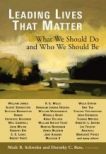 Another anthology that I dip in to from time to time—it is great when one needs inspiration, or a thoughtful reminder during hard times, or for sermon or class illustration—is the huge and diverse collection called Leading Lives That Matter: What We Should Do And Who We Should Be smartly edited by Mark Schwhehn & Dorothy Bass (Eerdmans; $26.00.) I’ve written about this before, marveling at the literary breadth of these fine pieces—excerpts from Homer and Milton to Dietrich Bonhoeffer and Dorothy Day, Wendell Berry to Robert Frost. The book offers historic essays arranged around seven key aspects of one’s identity, crucial stuff to be sure about in the search for significance. Wonderful, wonderful.
Another anthology that I dip in to from time to time—it is great when one needs inspiration, or a thoughtful reminder during hard times, or for sermon or class illustration—is the huge and diverse collection called Leading Lives That Matter: What We Should Do And Who We Should Be smartly edited by Mark Schwhehn & Dorothy Bass (Eerdmans; $26.00.) I’ve written about this before, marveling at the literary breadth of these fine pieces—excerpts from Homer and Milton to Dietrich Bonhoeffer and Dorothy Day, Wendell Berry to Robert Frost. The book offers historic essays arranged around seven key aspects of one’s identity, crucial stuff to be sure about in the search for significance. Wonderful, wonderful.
Two small hardbacks are both so very handsome to hold that they invite slow reading and
careful reflection. I told students to be attentive to their lives and the world around us—rousing stories of God’s faithfulness to us as we take up our callings to make a difference preach well, but eventually, we must be reminded to sit in silence a bit, thinking, praying, reflecting, listening. If I’d had opportunity, I would have shown these two: Let Your Life Speak: Listening for the Voice of Vocation by Parker Palmer (Jossey Bass; $18.95) and The Echo Within: Finding Your True Calling by Robert Benson (Waterbrook; $14.99 ) These are truly lovely books, inspiring and tenderly written. I have reviewed them in the past, and assume you may know of our fondness for these contemplative authors. Highly recommended for those discerning vocation, wanting to nurture the habits of being a bit more attentive about one’s life, or for those who guide others. Nice.

http://trinitypartners.org/page/2/
 In case you are wondering, yes, I did highlight a book or
In case you are wondering, yes, I did highlight a book or 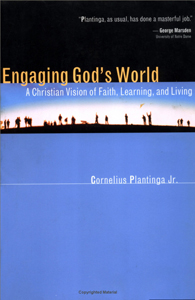 two about the calling and vocation of being a Christian student. Even as young adults who want to prepare for a lifetime of vocation ponder these deep perspectives, they need to enter into the practices of vocational living, even in the way they approach their calling into college. You may know that my all time favorite book for college students is co-written by a wonderful, gracious and very (very) smart Donald Opitz, who is, in fact, a professor at Geneva. (His co-author is my central PA pal and regular customer here, Derek Melleby.) Derek & Don’s fine book is called The Outrageous Idea of Academic Faithfulness (Brazos; $13.99) and I have made my case for it here before. Again, if you are a pastor or youth worker, I think it is nearly professional malpractice not to get this into the hands of your college-bound friends.
two about the calling and vocation of being a Christian student. Even as young adults who want to prepare for a lifetime of vocation ponder these deep perspectives, they need to enter into the practices of vocational living, even in the way they approach their calling into college. You may know that my all time favorite book for college students is co-written by a wonderful, gracious and very (very) smart Donald Opitz, who is, in fact, a professor at Geneva. (His co-author is my central PA pal and regular customer here, Derek Melleby.) Derek & Don’s fine book is called The Outrageous Idea of Academic Faithfulness (Brazos; $13.99) and I have made my case for it here before. Again, if you are a pastor or youth worker, I think it is nearly professional malpractice not to get this into the hands of your college-bound friends.
The “next step” book for those interested in the integration of faith and learning is the beautifully rendered and exceptionally insightful Engaging God’s World: A Christian Vision of Faith, Learning and Living by the elegant Cornelius Plantinga (Eerdmans; $16.00.) So much of this is quotable, so good to cite, that I have whole pages underlined in my dog-earred copy. If you don’t own it, again, I think it would be a wonderful addition to your own library, and one you will certainly share with anyone wondering about education, the relationship of Christ’s Lordship to our vocations in the world, and how our deepest yearnings can be met as we take up this journey towards thoughtfully faithful living. Our highest five star rating on this one (whether one is in college or not.) I wish I had mentioned it more at the Geneva chapel talk, so if anybody from our time there is reading now, consider this a plug. Check out our blog special price below and consider placing an order.
Or, check out this list on the “Christian mind” and see if any of these would be helpful to students you know. These sorts of titles are not the kind they will find most places, so you may be the only person to share such a life-line and challenge. Let us know if we can help.
order here
takes you to the secure order form page
inquire here
if you have questions or need more information
Hearts & Minds 2345 East Main Street Dallastown, PA 17313 717-246-3333

another wonderful post, Byron! It’s good to know about Nichols’ booklet. I’ve read with deep encouragement the books by Guinness, Benson and Palmer. The books Plantinga and my friend, Derek, are on my short list.
Peace out-
Doug
Byron – Thanks for the ‘shout out’!
I spoke on Haggai myself this past week… a few of the real problems of that day were that the remnant that returned to rebuild “The house of prayer for all nations” found themselves:
(1) consumed with their own work and ignored the work of having God dwell among them again (2)diverting God’s resources to their own personal projects (3) Trusting again in their own resources for safety, rather than in God.
The great thing was that they did repent and God blessed them for a few more generations. Eventually through the descendants of their faithful leader Zerubbabel (the seed of Babylon) who had been replanted in Jerusalem, the Messiah came to inhabit the temple once again.
Great stuff! THANKS! Let’s do stay in touch…